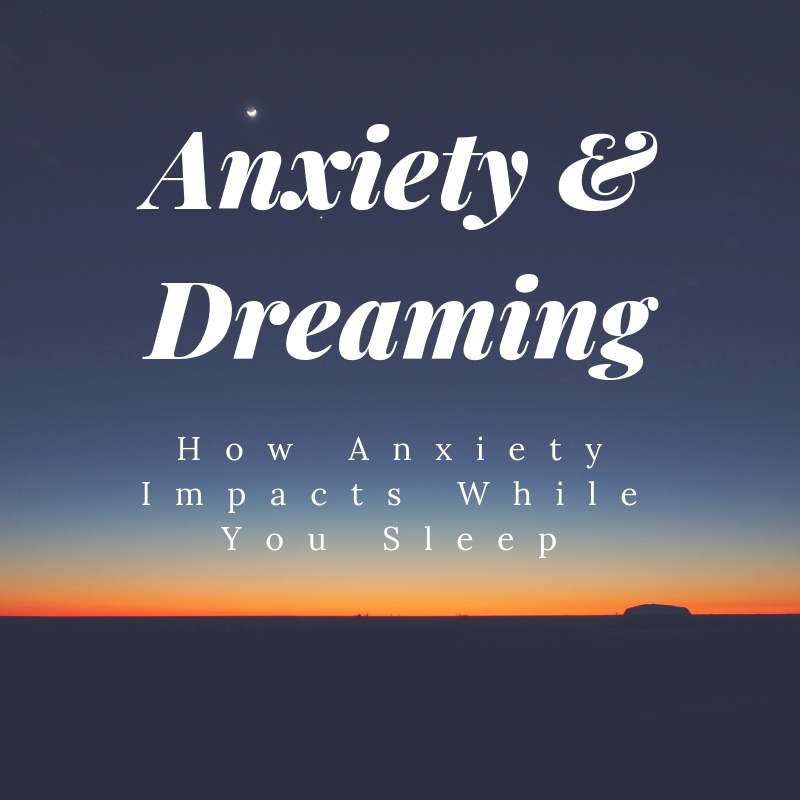Required
Anxiety and Dreaming – How Your Anxiety Impacts While You Sleep

Anxiety and Dreaming – How Your Anxiety Impacts While You Sleep
If you are currently struggling with anxiety then one thing you may have noticed is how it even seems to filter into your dreams while you are sleeping.
It’s something that people with anxiety often describe to me – that they seem to experience vivid, negative dreams at night. Those dreams can be filled with unpleasant scenarios that lead to them waking filled with sensations of dread and fear. Those anxiety filled dreams can create very real unpleasant emotions and feelings that may linger into the day.
Only yesterday, an anxiety client described how he had woken the night before during a dream, drenched in sweat, with his heart pounding and filled with fear and panic. Many other clients experience this or just find that those vivid images from their dreams upset them and make them feel low.
When I was a teenager I remember buying a book in a bargain bookstore all about dream interpretation. It would say things like if you dream of a cat you will come into money or lose money, if you dream of flying you are destined to soon travel and if you dream of being killed you will not awake! Seriously, it did say that sort of stuff (I often wondered about the last example there because how would anyone know?!).
Anyway, the world of understanding the role of dreams has moved on a lot since then! And there’s some recent research about how your anxiety while awake impacts on the content of your dreams.
Anxiety and Negative Dreams
Perhaps the most attractive and compelling theory about why we dream comes from the Human Givens Institute. Their ‘expectation fulfilment theory’ suggests that our dreams are where we close of any unresolved emotions from the day. That is, if while we are awake we generate an emotion, however slightly, that isn’t acted upon in some way, then at night our brain metaphorically closes off that emotion (so that it is ‘dealt with’).
Thus, if you experience anxiety and worry about something that you cannot or do not act upon in some way during the daytime, your brain will need to metaphorically complete that process by de-arousing your automatic nervous system.
And of course, we all have emotions that we don’t act upon each day so we all dream, yet those who have anxiety tend to dream more and have more nightmares and more negative feelings and content expressed in the content of their dreams. It can then lead to tiredness from ‘over-dreaming’ (that feeling when you wake up feeling exhausted despite having had ‘enough’ sleep) or can lead to over-arousal and waking or being unable to get back to sleep or disturbed sleep. And all of this tiredness then makes it harder to deal with those anxious thoughts and feelings during the day, often exacerbating the anxiety problem.
This theory is certainly supported by a recently published research paper titled, ‘Peace of mind and anxiety in the waking state are related to the affective content of dreams.’ Their research explored the relationship between waking well-being and dream affect (that is, your subjective emotions, moods and feelings). Following their analysis, the researchers have shown that peace of mind is related to positive dream affect, whereas symptoms of anxiety are related to negative dream affect.
As the report says, “individuals with more symptoms of anxiety expressed more negative affect in subsequent dream reports and rated their dreams to contain more negative affect.”
They also write, “this is consistent with, and predicted by, the simulation theories of dreaming, especially the threat simulation theory, according to which perceived waking threats (increased anxiety during wakefulness) lead to increased threat simulation (and negative affect) in dreams.”
Interestingly the researchers not only looked at the relationship between waking well-being and dreams by focusing on symptoms of anxiety, they also looked at well-being (e.g. life satisfaction, positive affect, well-being, peace of mind). The study found that people with more peace of mind expressed more positive dream affect. Peace of mind “is characterised by inner peace and harmony which can be achieved by accepting both positive and negative experiences, balancing between positive and negative affective states and controlling one’s mental states.”
This, of course, is very much what cognitive behavioural hypnotherapy helps you to achieve. By learning to manage and regulate your thoughts, feelings, actions and reactions you can learn to enjoy the positives and to more calmly cope with, handle and deal with life’s challenges.
So if you are experiencing negative dreams and nightmares it may well be a consequence of your daytime anxiety and worry. This means that it is probably another symptom of those thoughts and feelings and by learning to manage your waking emotional state you will also begin to improve your non-waking nights.
To your success,
Dan Regan
Anxiety Hypnotherapy Ely & Newmarket
If anxiety is impacting on your waking hours and your sleep then you should book your free initial consultation today.
Also have a look at what other people have said about their hypnotherapy sessions.
In addition, you may very well find that my Anxiety Relief and Anxiety Thought Release hypnosis downloads!
Reference: Peace of mind and anxiety in the waking state are related to the affective content of dreams, Pilleriin Sikka, Henri Pesonen & Antti Revonsuo. https://www.nature.com/articles/s41598-018-30721-1
Get Your Copy Right Now…
Subscribe to Dan’s Digest filled with tips, strategies and techniques and get instant access to your free rapid relaxation hypnosis audio track.
Enjoy feeling and being more mentally calm and physically relaxed right now:




0 Comments